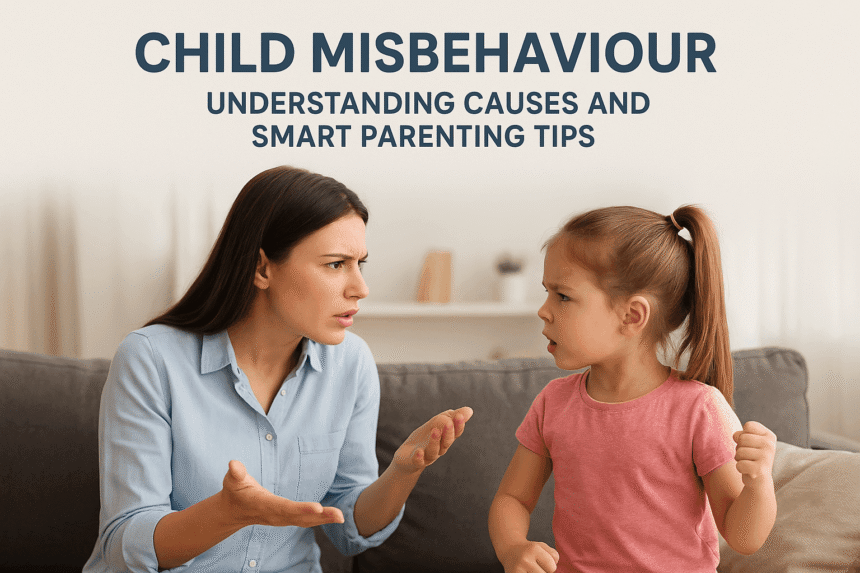Child misbehaviour is one of the most common challenges parents face, and this blog aims to shed light on why it happens and how to handle it effectively. Every parent has moments when their child throws tantrums, refuses to listen, or behaves aggressively. While it can be frustrating, misbehaviour is not always about disobedience—it is often a sign that the child is struggling to express emotions, facing unmet needs, or testing boundaries. Understanding the reasons behind misbehaviour can help parents respond with patience, guidance, and love rather than anger.
What is Child Misbehaviour?
Child misbehaviour refers to actions or behaviours that go against accepted rules or expectations, such as talking back, lying, fighting, or throwing tantrums. For example, a child refusing to do homework or constantly interrupting while parents talk may appear disrespectful, but it might be their way of seeking attention or resisting stress. Misbehaviour doesn’t mean a child is “bad”; it’s usually a stage in their learning and emotional growth.
Understanding the Root Causes of Child Misbehaviour
- Seeking Attention
Many children misbehave when they feel ignored. For instance, a child might start whining loudly while the parent is on the phone just to get noticed. In such cases, misbehaviour is not the goal—attention is. - Testing Boundaries
Children are naturally curious about how far they can go. A toddler may repeatedly touch something after being told “no” just to see the parent’s reaction. This is their way of understanding limits. - Emotional Overload
Just like adults, children experience stress, frustration, or anger. A child returning from school, cranky and uncooperative, may be exhausted rather than deliberately being difficult. - Unmet Needs
Misbehaviour often arises when basic needs like hunger, sleep, or comfort are not met. A tired child might cry or refuse to follow instructions because their body is overwhelmed. - Imitating Others
Children copy what they see. If they notice siblings, friends, or even adults raising their voice or arguing, they may mirror that behaviour at home.
7 Types Of Child Behaviours That Are Dangerous To Ignore
How to Deal With Child Misbehaviour

- Stay Calm and Patient
Reacting with anger often worsens the situation. For example, if your child is throwing a tantrum in public, instead of shouting, take a deep breath, kneel to their level, and calmly talk to them. This shows them how to manage emotions. - Understand the Trigger
Before correcting, identify why your child misbehaved. If a child refuses to study, check if they are tired, hungry, or overwhelmed by the subject. Addressing the cause is more effective than punishment. - Set Clear and Consistent Rules
Children need clear boundaries. If bedtime is 9 pm, stick to it. Inconsistent rules confuse children and encourage repeated misbehaviour. Use positive language like, “We keep toys in the box after playtime,” instead of just saying, “Don’t mess the room.” - Use Positive Reinforcement
Appreciate and reward good behaviour. For example, if your child shares toys with a sibling, praise them: “I love how you shared! That was very kind.” This encourages repetition of good behaviour. - Teach Problem-Solving Skills
Help children learn better ways to express themselves. If they fight with a sibling over a toy, guide them to take turns rather than scolding them. Over time, they learn peaceful conflict resolution. - Be a Role Model
Children learn more from actions than words. If parents handle stress calmly, avoid yelling, and practice respect, children are likely to follow. - Offer Choices
Giving limited choices reduces power struggles. For instance, instead of saying “Eat your food now,” say, “Would you like rice first or vegetables first?” This makes them feel respected and in control.
Conclusion
Child misbehaviour is a natural part of growing up, but how parents respond makes all the difference. By understanding the root causes and handling situations with empathy, parents can guide children towards better behaviour and emotional growth. Instead of focusing only on discipline, focus on connection, communication, and consistency. Remember, every misbehaviour is an opportunity to teach valuable life lessons.
How do you usually respond to child misbehaviour at home, and which of these parenting tips do you find most effective?
Behaviour Management In Children: Proven Positive Strategies
FAQs on Child Misbehaviour
1. Is child misbehaviour normal?
Yes, it is a normal part of development as children learn boundaries, emotions, and self-control.
2. Should parents punish misbehaviour?
Harsh punishment is not effective. Positive discipline, guidance, and consistency work better than fear-based methods.
3. How can I stop tantrums in public?
Stay calm, acknowledge the child’s feelings, and distract or redirect attention. Avoid shouting, as it escalates the situation.
4. Can misbehaviour indicate deeper problems?
Yes, frequent or extreme misbehaviour can sometimes signal emotional, learning, or behavioural issues. In such cases, professional help may be needed.
5. What is the best way to encourage good behaviour?
Praise, positive reinforcement, consistent rules, and being a good role model are the most effective methods.
Thank you for taking the time to explore this post. I hope you found it both insightful and enjoyable.
Remember, your sharing can make a positive impact! Please share this post across your social media and other networks, allowing others to benefit from its content.
PVM

Mathukutty P. V. is the founder of Simply Life Tips, a blogger, content writer, influencer, and YouTuber passionate about learning and sharing. Guided by “Simple Living, Creative Thinking,” he believes in the power of knowledge sharing and lifelong learning.
Related
Discover more from Simply Life Tips
Subscribe to get the latest posts sent to your email.







